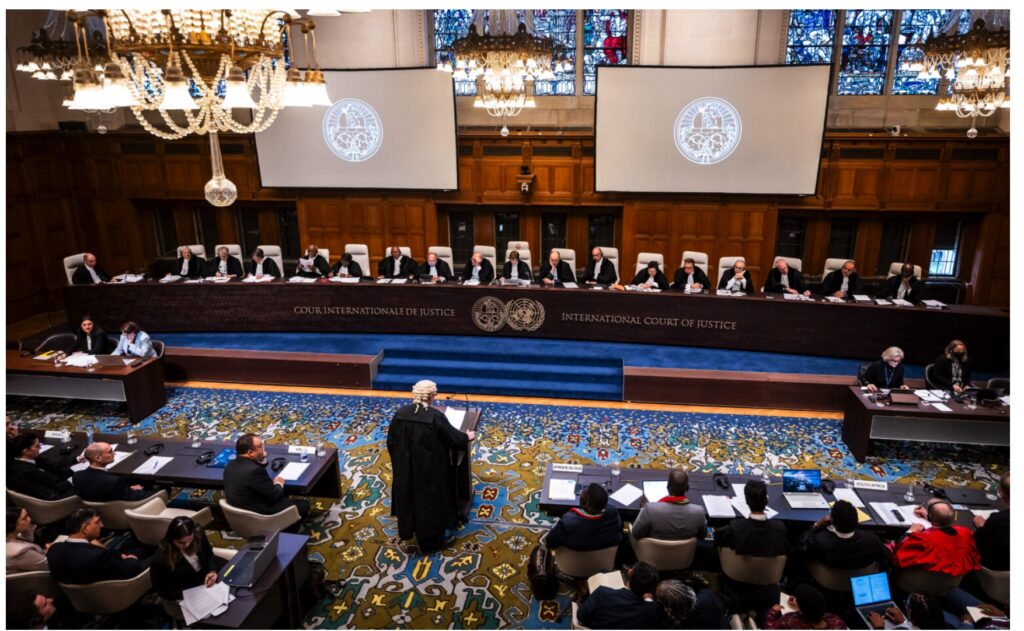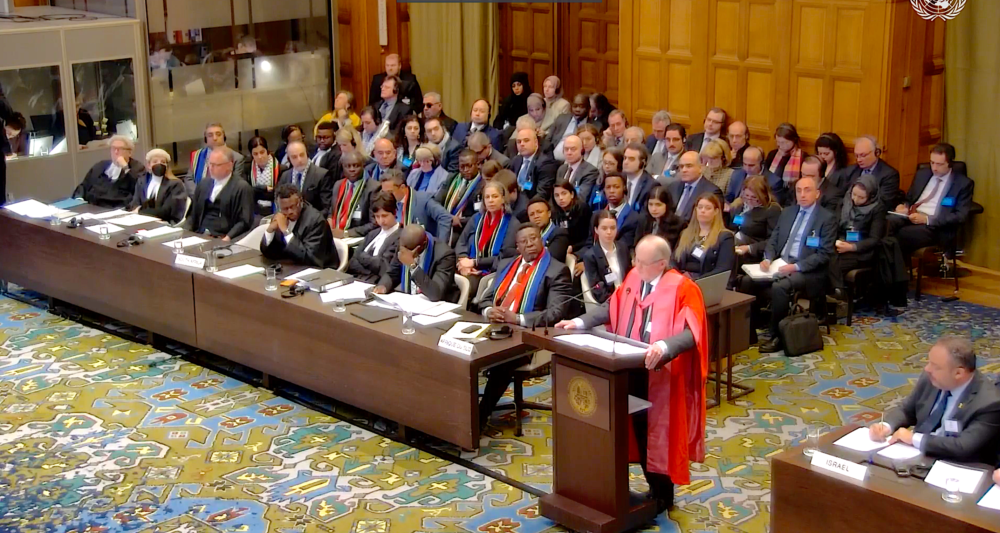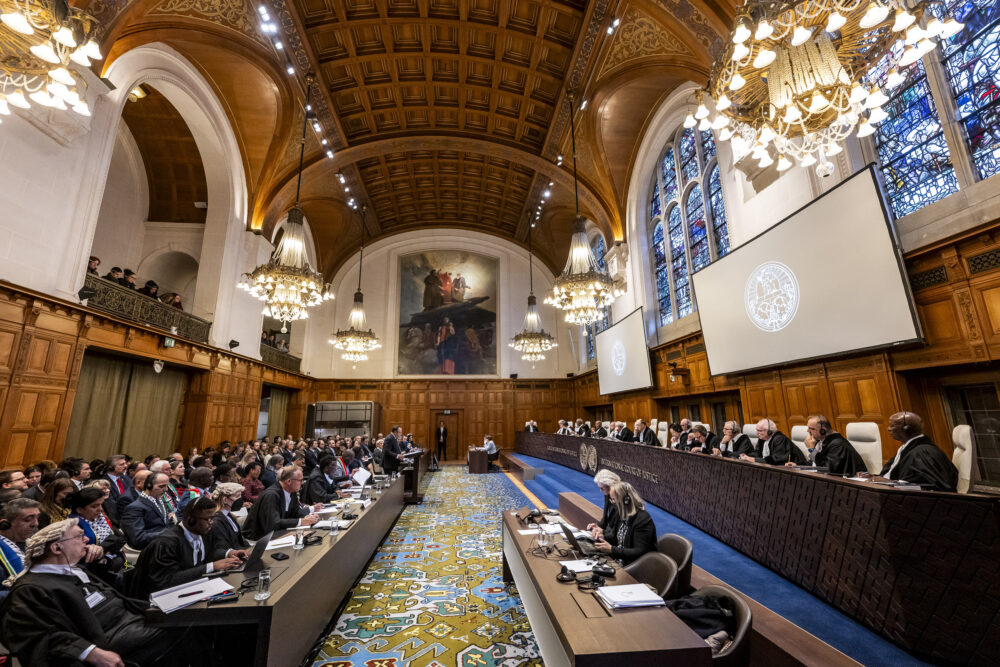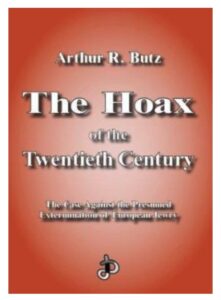By Joe Lauria
In its defense last Friday before the World Court against allegations by South Africa that it is committing genocide in Gaza and must be stopped, Israel made a legal argument that could torpedo the case if the court buys it.
In order for a claim to reach the International Court of Justice, there must be an established dispute between two states. Israel’s argument is that such a dispute was never established and thus the ICJ lacks jurisdiction to hear South Africa’s claim.
There would be a political outcry from those who seek to stop Israel’s ongoing slaughter in Gaza if the Court decides to dismiss the case on this technicality.
But given the pressure the Court is no doubt feeling from the United States, Germany and other allies of Israel it might be the best, if not the only way for the Court to escape without having to decide that it’s merely plausible that Israel is committing genocide.
That is the bar that needs to be met at this preliminary stage of the case for the Court to issue provisional measures to order Israel to cease its military operation.
The Dispute Over a Dispute
On Thursday, South Africa tried to build a case, probably in anticipation of Israel’s bid, that this was indeed a dispute between Israel and South Africa and it indeed belonged before the World Court.
John Dugard, a South African professor of international law, told the Court:
“The South African Government repeatedly voiced its concerns, in the Security Council and in public statements, that Israel’s actions had become genocidal. On 10 November, in a formal diplomatic démarche, it informed Israel that while it condemned the actions of Hamas, it wanted the International Criminal Court (ICC) to investigate the leadership of Israel for international crimes.
On 17 November South Africa referred Israel’s commission of the crime of genocide to the International Criminal Court for ‘vigorous investigation’. In announcing this decision President Ramaphosa publicly expressed his abhorrence ‘for what is happening right now in Gaza, which is now turned into a concentration camp where genocide is taking place’.
To accuse a State of committing acts of genocide and to condemn it in such strong language is a major act on the part of a State. At this stage it became clear that there was a serious dispute between South Africa and Israel which would end only with the end of Israel’s genocidal acts.
South Africa repeated this accusation at a meeting of BRICS on 21 November 2023 and at an Emergency Special Session of the United Nations General Assembly on 12 December 2023. No response from Israel was forthcoming. None was necessary. By this time, the dispute had crystallized as a matter of law. This was confirmed by Israel’s official and unequivocal denial on 6 December 2023 that it was committing genocide in Gaza.”
Dugard added that “as a matter of courtesy” before filing the case with the ICJ on Dec. 29, South Africa sent a “Note Verbale to the Embassy of Israel to reiterate its view that Israel’s acts of genocide in Gaza amounted to genocide — that it, as a State party to the Genocide Convention, was under an obligation to prevent genocide from being committed.”
“Israel responded,” Dugard said, “by way of a Note Verbale that failed to address the issues raised by South Africa in its Note and neither affirmed nor denied the existence of a dispute.”
On Jan. 4, South Africa sent another Note Verbal highlighting Israel’s failure to respond adequately to South Africa’s concerns, and concluded that the dispute between the nations was “plainly not capable of resolution by way of a bilateral meeting.”
In addition, on Nov. 20 Israel recalled its ambassador to South Africa in protests over South Africa calling Israel’s operation in Gaza “genocidal,” which can clearly be interpreted as a dispute.
Israel Says There is No Dispute
For its part, Israel on Friday argued that no such dispute exists and therefore the Court lacks jurisdiction over the case. Quoting from Article IX of the Genocide Convention, British attorney Malcolm Shaw KC, representing Israel, told the Court:
“Whether or not a dispute in these terms exists at the time of the filing of the Application is a matter for objective determination by the Court, ‘it is a matter of substance, and not a question of form or procedure’. The Court will ‘take into account in particular any statements or documents exchanged between the Parties as well as any exchanges made in multilateral settings’, the Court has said.
The key point here is the use of the term ‘exchange’ between the parties. Unilateral assertion does not suffice. There needs to be some element of engagement between the parties. The element of interchange and bilateral interaction is required. A dispute is a reciprocal phenomenon.”
Shaw made clear Israel does not believe such an exchange took place:
“South Africa cites only a couple of general public statements by Israel referencing merely a press report by Reuters and a publicity release from the Israeli Ministry of Foreign Affairs. These responses were not addressed directly or even indirectly to South Africa. There is no evidence of ‘positive opposition’ as required by the Court.
Further, South Africa cites no relevant exchange between the Parties, which would be the normal fashion for the expression and determination of a dispute between States. This actually typifies how South Africa has approached this matter. It seems to believe that it does not take two to tango. It is sufficient if one State determines there is a dispute, leaving the other party flummoxed.
It is thus disingenuous for Professor Dugard to conclude that ‘Israel must have been aware from South Africa’s public statements, démarche and referral to the International Criminal Court of Israel’s genocidal acts that a dispute existed between the two States’. This is not a dispute, it is a ‘unispute,’ a one-sided clapping of hands.”
Shaw said Israel did respond to the Notes Verbale on Dec. 26 by offering to arrange a meeting between the two foreign ministries at South Africa’s “earliest convenience.” The Israeli embassy tried to deliver this note on Dec. 27 to the South African foreign ministry but the ministry was closed because of a holiday, Shaw said.
He claims Israel was informed by the South Africans on Dec. 28 that the note should be hand-delivered on Jan. 2, but on Dec. 29 filed the case with the ICJ, allowing no time for the states to have a dialogue.
That South Africa did not wait for this bilateral meeting before filing with the court puts its case at risk.
Legal Experts Weigh In
“There does have to be a position stated by one side and rejected by the other before there is a dispute,” John Quigley, professor emeritus at the Moritz College of Law of Ohio State University, told Consortium News. “But there was probably sufficient statement by [South Africa] that it thought Israel was committing genocide, and sufficient statement by Israel that it was not committing genocide for there to be a ‘dispute” between the two.’”
Quigley added, “If the court wants to avoid giving provisional measures, it could use this.” He made clear, however, that he thought this was unlikely to happen.
Analyst Alexander Mercouris concurred. He told CN:
“In a sane world it should not defeat the claim. After all, in what sense has Israel been prejudiced? And given that the case is about genocide there is a strong case for acting with urgency. However if the Court wants to find some way out of hearing the case, this lapse has provided it.
If the Court were to take this view, South Africa would have the option of requesting the Israeli response, and then re-filing, either when Israel provided its reply or, in the event that Israel inordinately delayed its reply, when that became clear.”
American academic Norman Finkelstein, told an interviewer: “It will completely discredit the Court if they issue a decision — we have decided not to pursue this case of genocide because we don’t think there is a dispute. That just can’t work.”
Francis Boyle, a professor of international law at the University of Illinois Urbana-Champaign, represented Bosnia-Herzogovina at the ICJ where he brought a case of genocide against Yugoslavia in 1993.
“To the best of my knowledge the [Yugoslavs] did not know of my genocide lawsuit until the Registrar informed them of it,” Boyle said in an email. “Again, this created no problems for me with the Court on winning my first Order of Provisional Measures of Protection on April 8 [1993].”
Boyle added that Bosnia’s then president, Alija Izetbegovic was at the time “pretty busy negotiating” the Vance-Owen peace deal at U.N. headquarters in New York. “I don’t think he said anything about my genocide lawsuit to the [Yugoslavs] there before I sued them.”
Thus the fact that Sarajevo and Belgrade never directly disagreed about a genocide claim did not affect the Court’s decision to issue provisional measures against Yugoslavia.
In an article published on Consortium News on Sunday, former British diplomat Craig Murray, who was in the public gallery for both days of the hearing, wrote that simply refusing to respond to an allegation of genocide cannot become a way for a nation to continue committing it with impunity. He wrote:
“The case could be technically invalid, and then [the judges] would neither have to upset the major Western powers nor make fools of themselves by pretending that a genocide the whole world had seen was not happening. For a while, they looked visibly relieved. Israel is hoping to win on their procedural points about existence of dispute …
The obvious nonsense [Israel] spoke about the damage to homes and infrastructure being caused by Hamas, trucks entering Gaza and casualty figures, was not serious. They did not expect the judges to believe any of this. The procedural points were for the court. The rest was mass propaganda for the media.”
Murray added:
“I am sure the judges want to get out of this and they may go for the procedural points. But there is a real problem with Israel’s ‘no dispute’ argument. If accepted, it would mean that a country committing genocide can simply not reply to a challenge, and then legal action will not be possible because no reply means ‘no dispute’. I hope that absurdity is obvious to the judges. But they may of course wish not to notice it…”
Joe Lauria is editor-in-chief of Consortium News and a former U.N. correspondent for The Wall Street Journal, Boston Globe, and other newspapers, including The Montreal Gazette, the London Daily Mail and The Star of Johannesburg. He was an investigative reporter for the Sunday Times of London, a financial reporter for Bloomberg News and began his professional work as a 19-year old stringer for The New York Times. He is the author of two books, A Political Odyssey, with Sen. Mike Gravel, foreword by Daniel Ellsberg; and How I Lost By Hillary Clinton, foreword by Julian Assange. He can be reached at joelauria@consortiumnews.com and followed on Twitter @unjoe







The courts are essentially political in nature. I don’t know anything about the International Court of Justice, but I suspect it is not much different from other courts, and hearing boards that we have unfortunately dealt with. Rather than protecting the public good, they are like to make it up as they go along. I have a strong suspicion that many of the members fear being ultimately taken out by the Mossad. Dr. Fetzer always ends his shows with the advice that, “We don’t know when our lives are going to end.”
https://en.wikipedia.org/wiki/Mossad_assassinations_following_the_Munich_massacre
I seriously doubt that the court will reject this case on technical grounds, since it will be immediately refiled and the case will have to then be reheard.
The Israeli defense was weak–which was the best that it ever could have been. The discounting of genocidal intent was pathetic–after all, what high-ranking government and military leaders were fired for making those disgusting statements? The lurid tales of mass rapes, indiscriminate killings, beheaded and burned bodies lack serious evidence and credibility–all that happened was a hostage-taking effort to force Israel to release hundreds or more of Palestinian prisoners. Certainly none of Hamas’s actions that justified the killing of over 25,000 civilians and the destruction of 40% of Gaza’s buildings. The notion the the IDF was trying to avoid civilian casualties is a total lie, since the Israeli Air Force dropped 2000-lb “dumb” bombs (weapons of mass destruction) in heavily populated areas without justification (the claim that hospitals were used as Hamas military headquarters is completely false). There was so much else about the Israeli defense that was so fallacious that any unbiased and knowledgeable jurist could see through it, but the International Court of Justice–like everything else in the world today–is less about justice and more about politics.